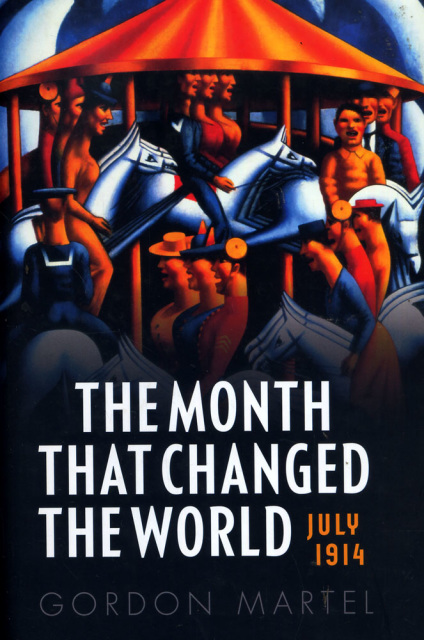The Month that Changed the World: July 1914 by Gordon Martel
SKU:
$18.00
$18.00
Unavailable
per item
The Month that Changed the World: July 1914 by Gordon Martel
On 28 June 1914, the Austrian Archduke Franz Ferdinand was assassinated at Sarajevo. Five fateful weeks later the Great Powers of Europe were at war.
Much time and ink has been spent over the last century trying to identify the "guilty" person or state responsible, or attempting to explain that no one was to blame, that "underlying" impersonal forces "inevitably" led to war in 1914. Unsatisfied with these explanations, Gordon Martel now goes back to the human dimension, to the contemporary diplomatic, military, and political records, in order to recount the twists and turns of the crisis afresh, with the aim of establishing just how the cataclysm was unleashed.
What emerges is the story of a terrible, avoidable tragedy -- a mystery that can be solved only by retracing the steps taken by those who took the world down the road to war. With each passing day we see how the personalities of leading figures such as Kaiser Wilhelm II, the Emperor Franz Joseph, Tsar Nicholas II, Sir Edward Grey, and Raymond Poincare were central to the unfolding crisis, how their hopes and fears intersected as events unfolded, and how, in spite of increasing tensions and escalating fears, a peaceful resolution appeared to be within their grasp until the final moments.
Devoting a chapter to each day of the infamous "July Crisis," this gripping account of the descent into the abyss of war makes clear just how little the conflict was, in fact, premeditated, preordained, or even predictable. Almost every day it seemed possible that the crisis could be settled as so many had been over the previous decade; almost every day a new initiative encouraged the hope that war could once again be avoided.
Why was war not avoided this time? By recounting the thoughts and arguments of those responsible for making the decisions, readers can judge for themselves why peace failed and who was responsible for the failure.
Oxford University Press, Hardcover, 2014
This is a BRAND NEW book.
On 28 June 1914, the Austrian Archduke Franz Ferdinand was assassinated at Sarajevo. Five fateful weeks later the Great Powers of Europe were at war.
Much time and ink has been spent over the last century trying to identify the "guilty" person or state responsible, or attempting to explain that no one was to blame, that "underlying" impersonal forces "inevitably" led to war in 1914. Unsatisfied with these explanations, Gordon Martel now goes back to the human dimension, to the contemporary diplomatic, military, and political records, in order to recount the twists and turns of the crisis afresh, with the aim of establishing just how the cataclysm was unleashed.
What emerges is the story of a terrible, avoidable tragedy -- a mystery that can be solved only by retracing the steps taken by those who took the world down the road to war. With each passing day we see how the personalities of leading figures such as Kaiser Wilhelm II, the Emperor Franz Joseph, Tsar Nicholas II, Sir Edward Grey, and Raymond Poincare were central to the unfolding crisis, how their hopes and fears intersected as events unfolded, and how, in spite of increasing tensions and escalating fears, a peaceful resolution appeared to be within their grasp until the final moments.
Devoting a chapter to each day of the infamous "July Crisis," this gripping account of the descent into the abyss of war makes clear just how little the conflict was, in fact, premeditated, preordained, or even predictable. Almost every day it seemed possible that the crisis could be settled as so many had been over the previous decade; almost every day a new initiative encouraged the hope that war could once again be avoided.
Why was war not avoided this time? By recounting the thoughts and arguments of those responsible for making the decisions, readers can judge for themselves why peace failed and who was responsible for the failure.
Oxford University Press, Hardcover, 2014
This is a BRAND NEW book.
1 available
